Trying to restart life from a roadside motel after the wildfires burn out
Weeks after their homes went up in flames, those left behind by the Oregon wildfires are starting from scratch in places like the Best Western.
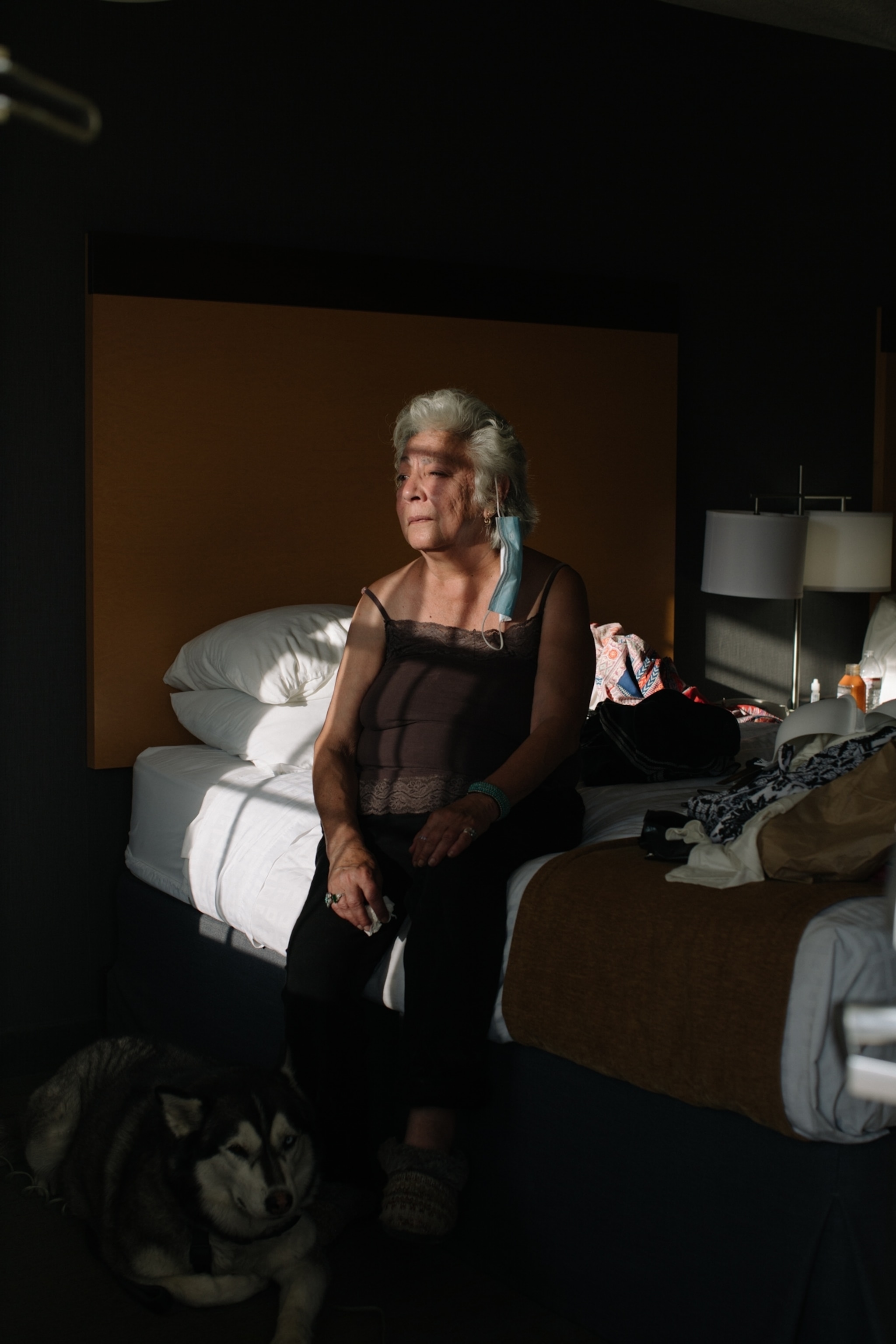
Little distinguishes the Best Western Horizon Inn from the row of other chain motels strung along the highway in Medford, Oregon. Two stories of rooms with a brick façade wrap around a parking lot and a small pool. But in the late afternoons, a unique collection of guests filters into the parking lot to mingle.
From room 114: An elderly man, his stepson, and his adopted daughter, who recently reunited with her family after a decade apart. Now they’re sharing a single room with two queen beds. From room 123: a retired criminal investigator, known by other guests for taking circuitous walks around the parking lot with her regal husky. From room 211: A couple, together for 30 years, searching for the urn containing the cremated remains of their son, their most treasured possession.
On the afternoon of September 8, a catastrophic fire tore through the towns of Talent and Phoenix, which sit 10 miles south of this hotel. The small, sleepy communities of trailer parks and retirement homes were engulfed in flames, and more than 2,000 homes—nearly half of each town—were destroyed in 24 hours. The devastation was historic—never before had so many structures been lost and people been evacuated in the state, where dozens of fires were burning simultaneously. In the ensuing days, hotels within a 50-mile radius were sold out, packed with those who’d fled the fires.
Now, as the days tick by, guests with homes still standing have been cleared to return. But those who remain—including in more than 60 rooms at the Best Western—have nowhere else to go. Some are waiting for insurance payouts. Others are house-hunting. Others still may become long-term residents. In the parking lot, their dogs sniff each other and their children play in the pool. They consult each other on insurance claims and share tips for getting federal aid.
While other hotels also host guests displaced by the fires, the Best Western has Darby Ayers-Flood. In addition to being regional manager for Best Western’s parent company, Kensington Management, she’s also the volunteer mayor of Talent. In the past weeks, her two jobs blended as she found herself running a hotel with 120 rooms of displaced families. Some of her constituents are now her guests.
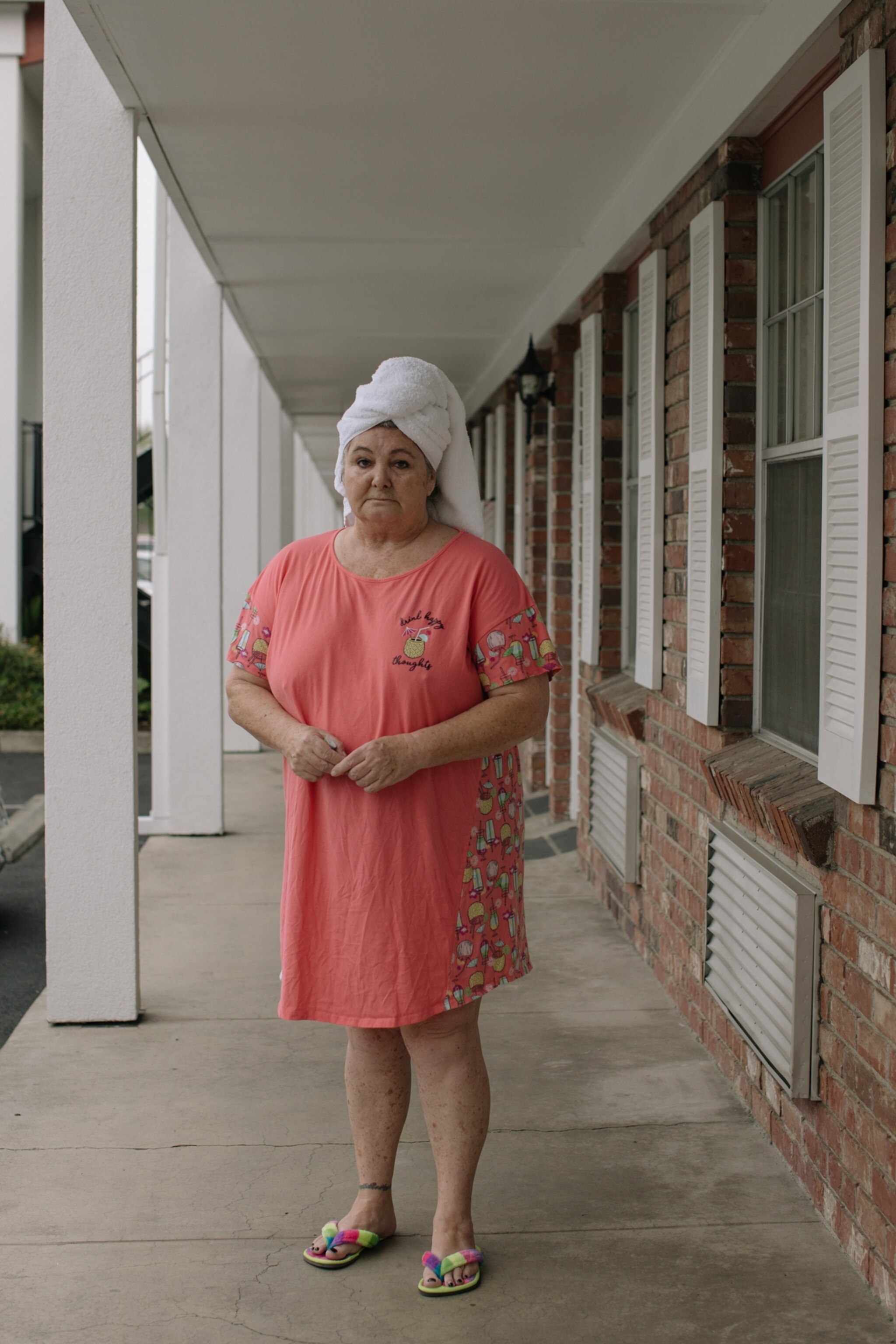
On a grey morning a week after the fire, Ayers-Flood had stepped out of her office and was gently asking Doug Ringgard about his plans.
On the morning of September 8, Ringgard had heard rumors of a fire in Ashland, some eight miles south of his home in Phoenix, a town of 4,500 people in the Rogue Valley of southern Oregon. He lived in Bear Lake Estates, an age 55-and-up mobile home community, along with his mother and stepfather. He had gone to check on them when he heard shouting: “Get out now!” He and his stepsister lifted their mother from her hospital bed into a wheelchair. Outside, a passing sheriff’s deputy helped them load her into a truck. Five minutes after they first heard the shouts, flames had reached their property.
“So you were five minutes ahead of the fire?” asks Ayers-Flood.
Ringgard nods. “I was looking at a 70-foot wall of flames.”
He couldn’t afford homeowners’ insurance, so the bike and backpack he grabbed on his way out are all he has left. He lost all his carpentry tools. His shed. His mobile home. His gun safe, which was rated to sustain 1,600 degrees for 60 minutes, had completely melted. Now he’s sharing a room with his stepsister and his stepfather. His mother is in the hospital, recovering from an earlier injury. “I’ll start again,” he says.
“You’re going to be a busy dude,” says Ayers-Flood.
“We’ve got a town to rebuild,” Ringgard replies.
After the fire
Ayers-Flood grabs a rag to wipe the layer of white ash that has settled on a small table nearby. Then she sits down and replays the events of the past week: Windstorms were nothing new in the area, but the day of the fire was particularly windy. And the timing—50 mph winds in September, late in Oregon’s fire season—was unusual. When Ayers-Flood received an alert about a small brush fire a few miles outside of Talent, she knew it was a bad combination.
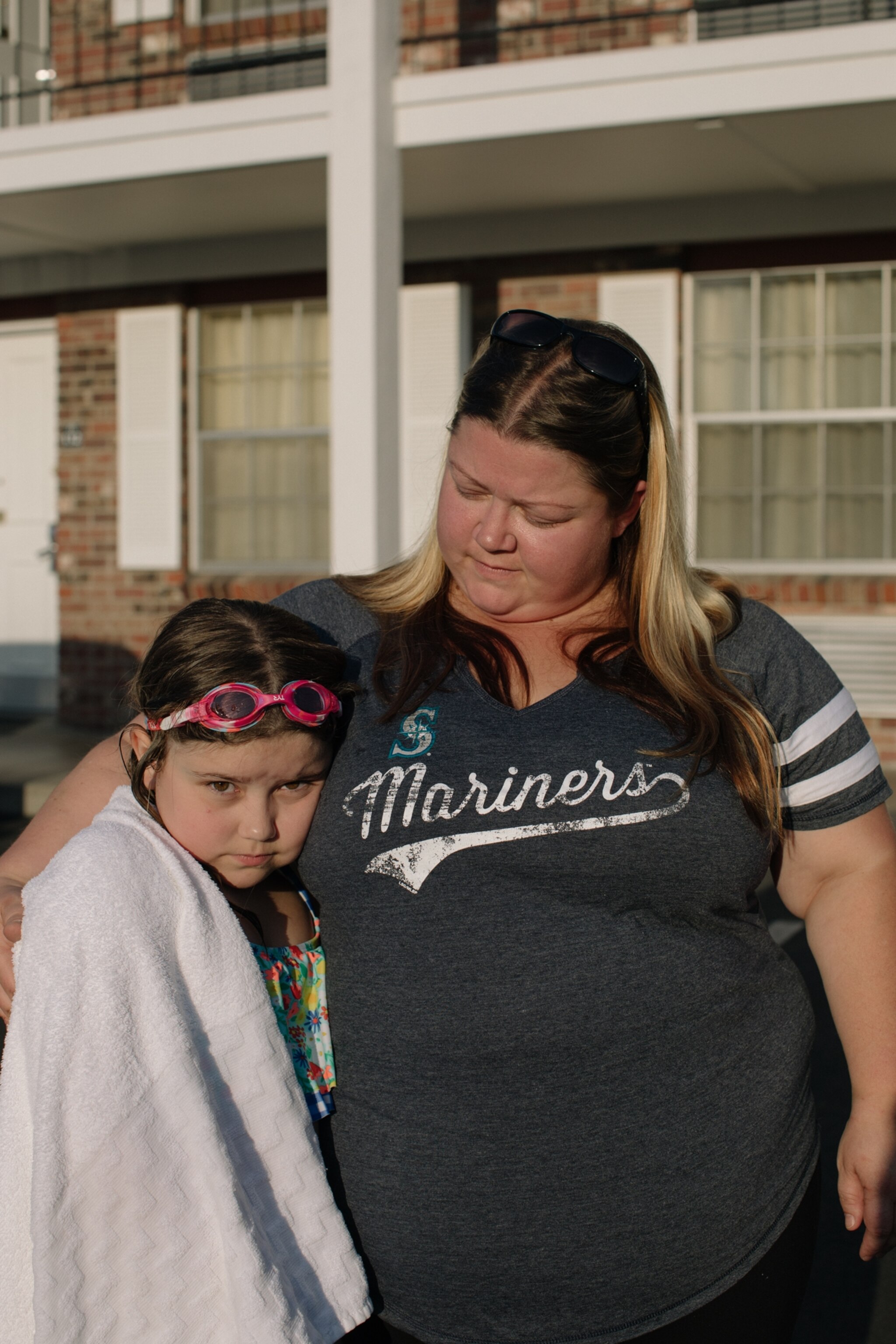
She left the hotel and headed home to evacuate her family, including her mother who’d had a stroke, to the Best Western. Soon more people began arriving. Dogs were barking in the parking lot. The reception, staffed for low-season, was in chaos.
To free up rooms, Ayers-Flood and her team called people with existing reservations and asked them to continue driving. Over the next few hours they accommodated nearly 250 evacuees and their pets in 120 rooms. Many were elderly. Almost all of them had left home with nothing.
Then, around 7 p.m. that same night, Ayers-Flood received a new alert: Another fire was heading toward the fully booked hotel. The southern highways were closed, so she told her guests to drive north. Once every room was empty, she drove to Grants Pass, 30 miles west, where she’d sent her family. They stayed the night at another Best Western.
The fire spared Medford. The next day, Ayers-Flood returned, turned the gas back on, and reconnected the computers. They were still on standby for evacuation—the whole city would be for five days—but guests trickled back, filling up the rooms again.
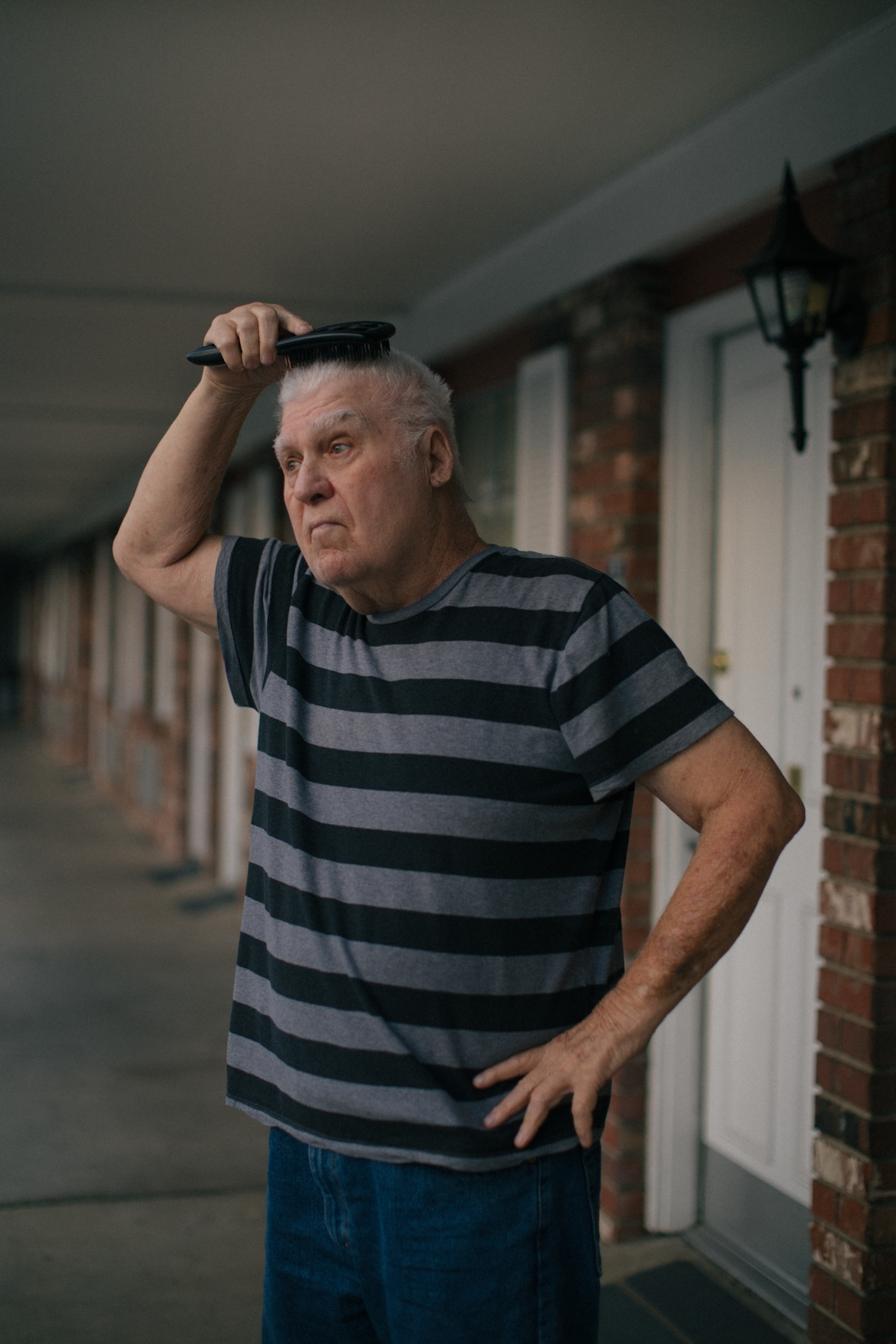
Ayers-Flood and her family had waited for the all-clear to return to their home, which had survived the fire. Her rental house and side business did not. Now, a week and a half after the fire, the air—reeking of smoke and the remnants of building materials—was still hazardous to breathe.
“If I have trauma, it’s yet to come,” she says. “You go into fight or flight.”
Life in the parking lot
Shortly after Ayers-Flood runs off to take a call from the Federal Emergency Management Agency (FEMA), a woman and her son pull into the Best Western parking lot. Carrying a towering pile of takeout boxes, they knock on Room 110 and hand fajitas to the elderly man inside. Crystal Rhodes has guests in four rooms to feed at this hotel, a task she signed up for on a “meal train” Facebook group, where volunteers can donate dinners. Sign-up sheets for food donations sit on the reception counter. Aid of all kind has poured into the hotel from strangers, local restaurants, and humanitarian groups.
Wearing slippers and a long cardigan, Josefina Cabral circles the parking lot with a husky named Luna. The dog howls. Distant sirens are driving Luna crazy, Cabral says. She walks past her room, which is propped open. E! plays on the TV and bags of dog food sit by the door.
“I’ve got to get out,” she says. “The room is getting smaller and smaller.”
Six years ago, when Cabral turned 60 and retired as a criminal defense investigator, she gave up her home and pool in Medford and moved to the Whispering Pines mobile home park outside of Phoenix. She loved it there. Nothing is left of her home now, nor the homes of most of her neighbors.
At first Cabral was in shock. Now she cries and gets angry. Anger, she says, is the final stage of grief. “I feel like I’m in a nightmare and I’m going to wake up,” she says. She thinks of her collection of books by Elisabeth Kübler-Ross, a psychiatrist who coined the theory of the five stages of grief. All those books are gone now. So are her goldfish and her mother’s ashes. Her mother, she says, brought her to Oregon from Mexico to escape poverty.
After the fire, Cabral says she was out walking when a passerby offered to take her to Walmart to buy new clothes. According to Cabral, everything she owns now—underwear, a laptop, a blanket—was donated by strangers. Organizations, businesses, and individuals alike have turned southern Oregon’s fairgrounds and parking lots into open-air donation markets. Misfortune, she says, brings out the good in people.
Spend enough time mulling around the parking lot, and you’ll spot a familiar face from your past life, she says. Or you’ll see someone worse off than you—a family crammed into one room, a man who had no insurance. Luna pulls Cabral on another loop through the hotel. “I can’t drive because I’m too preoccupied,” she says. The questions floating in her head distract her: “What am I going to do? Where am I going to go when I get out of this room?”
As the sun sets, the parking lot quiets. Residents disappear into their rooms. Not wanting to disturb their dad, who goes to bed early, Doug Ringgard and Christina Martin head outside to talk. Until three weeks ago, the stepsiblings had met once. Then Martin arrived in Phoenix to visit her father after a long estrangement and they all hit it off, cooking family dinners together every night. “Tuesday was pasta night,” says Ringgard. All the ingredients had been laid out on the counter. “They must have exploded,” Martin replies.
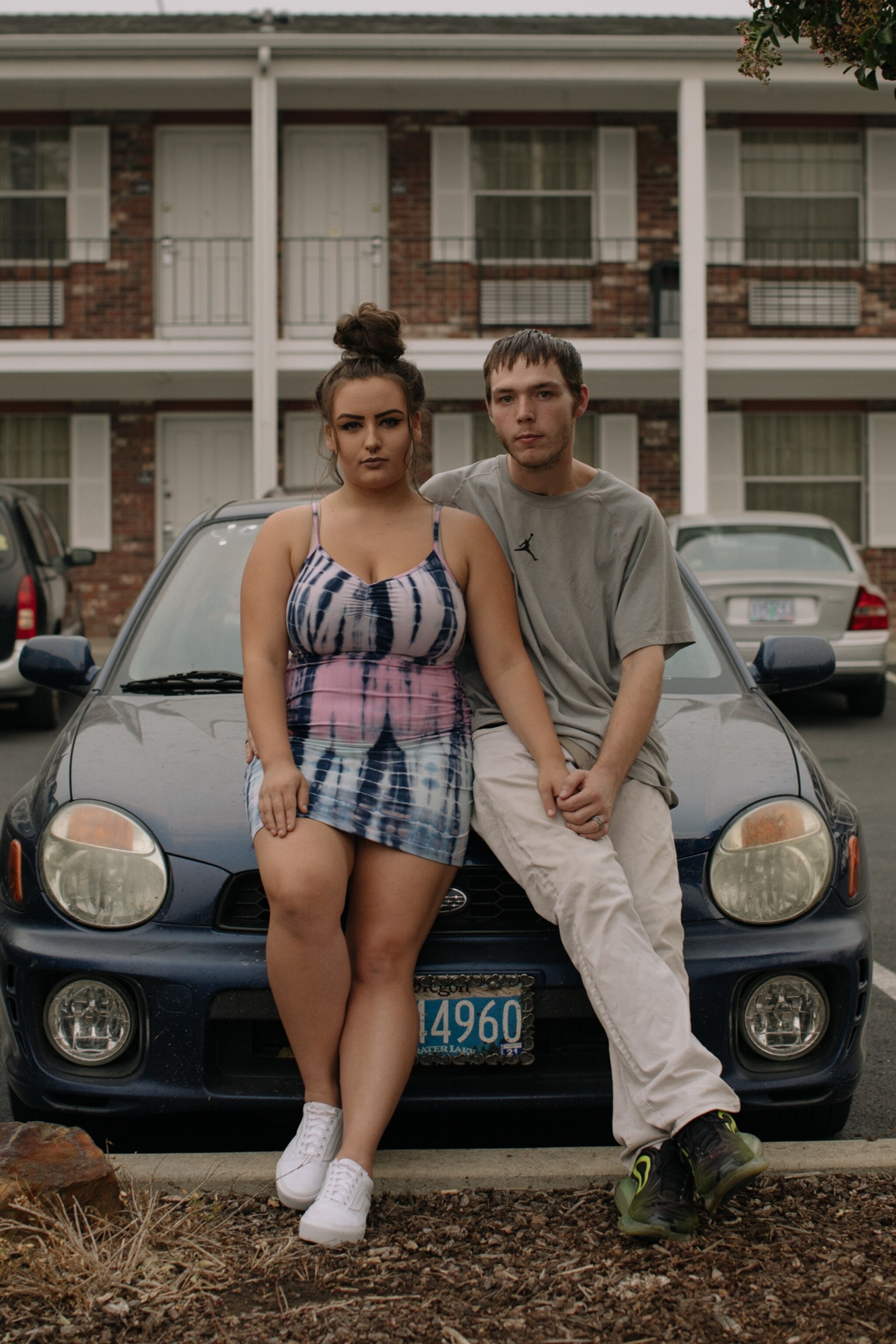
Their father is actively shopping for houses, though the insurance agent has told him not to buy until their claim is settled. Then, they’ll all stay together, at least for a little. “I never thought I’d be homeless at 52,” says Ringgard.
“I want to relocate to Oregon,” says Martin. “I know there are fires, but it’s beautiful.”
The things still missing
In the darkness, a white pickup truck pulls into the parking lot and Bob Svenson gets out holding a paper bag with dinner. Lisa McDaniels follows. They’re staying in 211. “This is all we have to our life,” Svenson says, pointing to the back of the pickup. There’s a metal foot locker that belonged to Svenson’s father during the Korean War and a squirrel lawn sculpture from McDaniels’s grandmother.
The afternoon of the fire, McDaniels, who suffers from migraines, laid down to take a nap in the mobile home she shared with Svenson. She woke to a crashing sound. The house was filled with smoke and the windows glowed red. She ran to the door, but the handle was too hot to touch. She pulled it open with a towel and started running. Houses on both sides of the street were ablaze and no one else was around. She ran until she couldn’t anymore. She started screaming. Then she saw a man spraying down his house with a hose. He was in shock, she thinks. They jumped in his truck and took off.
Svenson was at work when he heard about the fire and skirted police barricades until he reached the entrance to the park. It was so hot, he had to back up. Svenson and McDaniels found each other at the Jackson County fairgrounds, which had been transformed into an encampment. When Svenson pulled in he noticed his gas tank was completely empty. He’d been running on fumes. They ran toward each other, arms outstretched.
“Now when this becomes a Lifetime movie, I want Sandra Bullock for her,” says Svenson. “I’m going to be played by Kiefer Sutherland.”
The pair grin at each other. He’s a screen printer, with long hair tied into a ponytail and a bushy beard. He talks a mile a minute. When McDaniels interjects, she’s a quiet and calm antidote to his energy. They met 30 years ago at a party in Hayward, California. He offered her a slice of pizza, and they’ve been together since.
McDaniels believes they experienced divine intervention on the Tuesday of the fire. The noise that woke her, the gas tank that kept giving, the fact that she ran on an ankle that never healed from a bad break. Perhaps it was the doing of their son, she says, who died 10 years ago in a car accident at age 19. The urn with his remains was in their home, and they haven’t been able to retrieve it. They didn’t intend to leave their son there, Svenson says. “But it’s the only thing we need.”
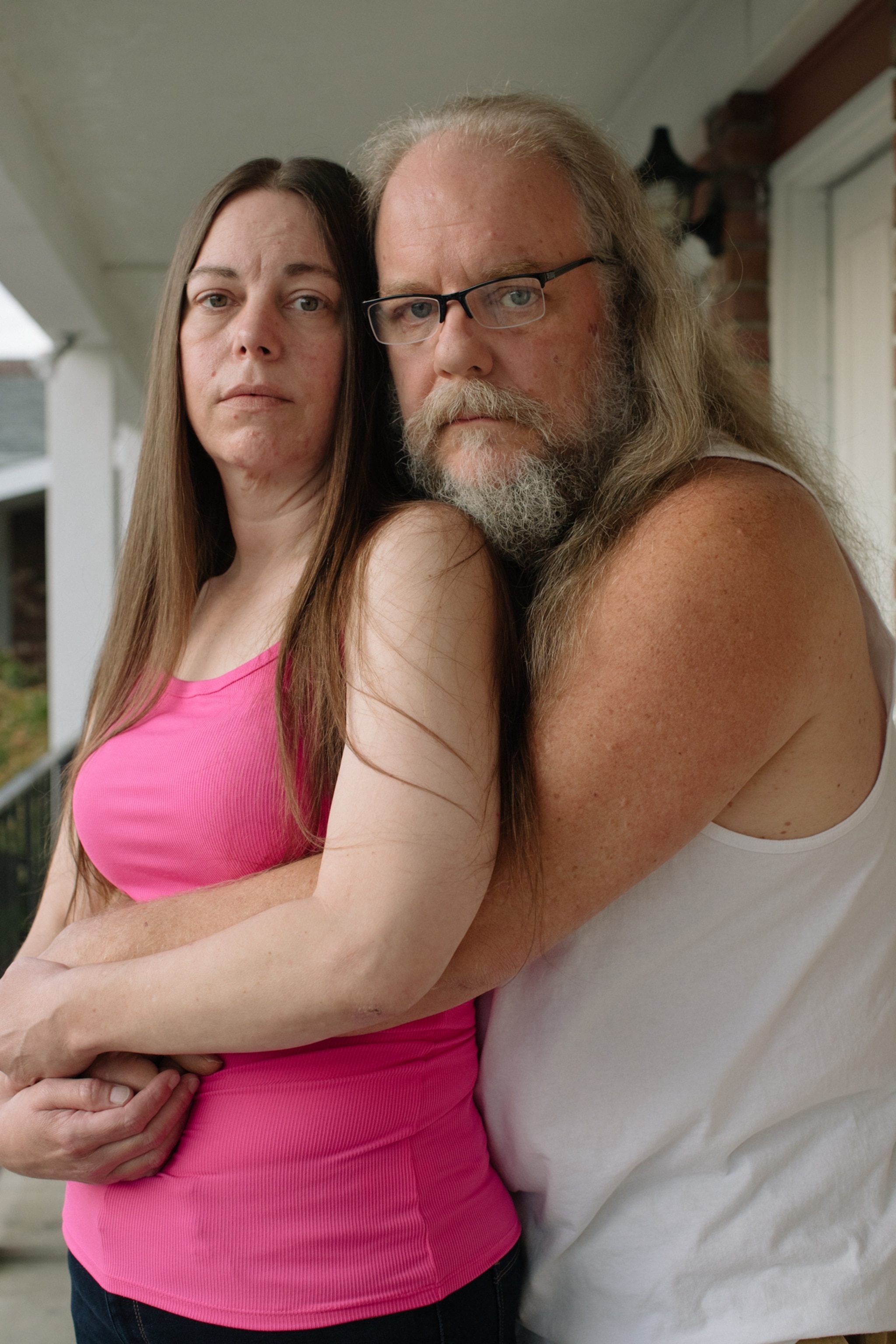
He wraps McDaniels in a hug. They’ve stayed together, he says, “through the pain of 2010 and the pain of 2020.”
“It brings us together,” McDaniels adds. “It tears some people apart.”
Before the fire, she had wanted to leave Oregon. But in the days after the fire, she watched the outpouring of support: A friend who set up a bed for them; the bikers having a fish fry in the Walmart parking lot; Svenson’s boss, who handed him $1,000 without comment.
She looks around the darkening parking lot at Ringgard, who stands nearby with a beer. They’d recognized him from their mobile home park in Phoenix a few days after the fire and urged him to get a room at the Best Western. “Since coming here I’ve gained so many friends,” she says. “That’s the reason I’m going to stay.”
Svenson and McDaniels plan to get married and settle on a piece of land with no trees. McDaniels points at a tote bag of insurance paperwork she’s been working on.
“They say Phoenix will rise from the ashes,” she says. “And it will.”